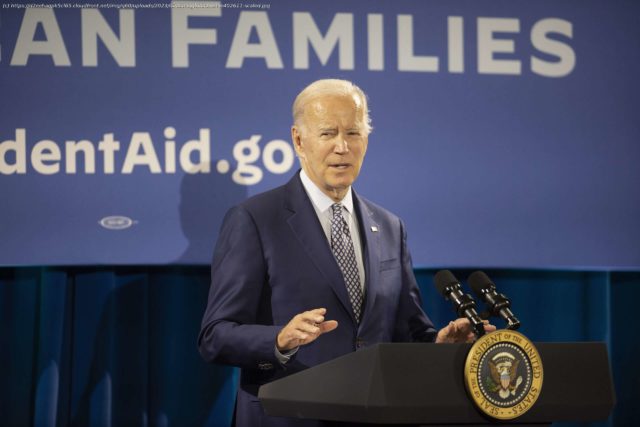President Biden’s student loan forgiveness plan hits the Supreme Court tomorrow. At stake is not just the debt cancellation but the bounds of executive power.
Challenge to Biden’s student debt plan hits Supreme Court tomorrow. On Tuesday, the Supreme Court will hear two lawsuits challenging President Joe Biden’s plan to erase a huge chunk of student loan debt.
Biden’s debt forgiveness plan, announced last August, applies to anyone with an income under $125,000 and allows for the cancellation of up to $10,000 in student loan debt for all borrowers and up to $20,000 for those with Pell Grants. Biden justified this giant flex of executive power by citing COVID-19.
Specifically, the Biden administration argues that the Higher Education Relief Opportunities for Students (HEROES) Act of 2003—which „permits the Secretary of Education to waive or modify Federal student financial assistance program requirements to help students and their families or academic institutions affected by a war, other military operation, or national emergency“—could be invoked in the summer of 2022 because of the coronavirus pandemic. (Never mind that Biden also said around the same time that the pandemic was „over.“)
„The HEROES Act was designed to let the executive branch ameliorate the student loan situations of service members fighting the war on terror,“ wrote Reason’s Eric Boehm last summer. But Biden twisted that to accomplish something Democrats have long wanted to do but have been unable to accomplish through the proper legislative channels.
The administration’s move quickly provoked a spate of lawsuits, which have since been winding their way through the federal court system. As part of this process, a federal appeals court issued a temporary injunction against the debt forgiveness.
The Supreme Court has agreed to hear two of the challenges. One suit was filed by the attorneys general of six states (Arkansas, Iowa, Kansas, Missouri, Nebraska, and South Carolina), who argue „that the debt-relief plan will harm state revenues and agencies that hold student loans,“ reports Inside Higher Ed. The other suit was brought by two Texans who „challenged the debt-relief plan because they wouldn’t benefit from all the provisions and didn’t have the chance to comment on the proposal.“
More from Inside Higher Ed:
The plaintiffs argue in the lawsuits that the Higher Education Relief Opportunities for Students Act of 2003 does not authorize the debt-relief plan—an argument that one federal judge has already agreed with….The Biden administration has said the law clearly authorizes the program and that relief is necessary to ensure those affected by the pandemic aren’t in a worse position financially once student loan payments resume. Payments are currently paused through the end of June, or 60 days after the lawsuits are resolved, whichever comes first.
The plaintiffs also want the justices to apply the major-questions doctrine to the case, which says in part that agencies need clear congressional authorization when carrying out policies that have economic and political significance.
Start
United States
USA — Political Showdown Over Student Loan Forgiveness Hits Supreme Court Tomorrow






